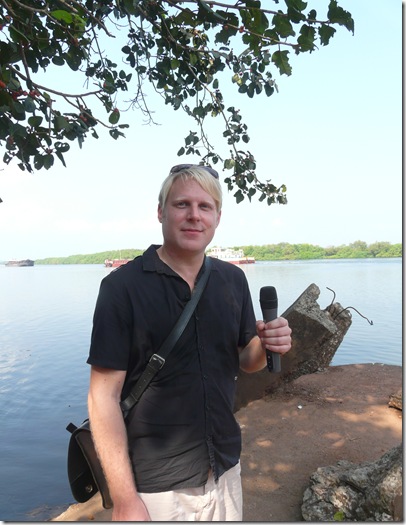Tobias Svanelid was in Goa to research material for a radio documentary centred around the 50th anniversary of Goa’s Liberation. He shared his thoughts with me on the subject.
Could you tell us a little about yourself and what you do?
I’ve been a reporter for the last ten-plus years, working for the Swedish Broadcasting Corporation (the Swedish equivalent of Britain’s BBC). I’m the head of a programme that’s dedicated to history and archaeology. It’s broadcast once a week, 25 minutes long. I have about 300,000 listeners.
It’s remarkable that this milestone of ours (50 years since liberation from Portuguese rule) should pique your interest in faraway Sweden sufficiently to get you to come here to do a story on it.
Well, it’s something that many Swedes do not know much about. They’ve heard of India of course, and of Goa, and of Portugal, but I think most Europeans do not have a clue about what happened here 50 years ago, and even less about the longer history about Portuguese Goa. So I’m doing two programmes: One on Portuguese history from the time of Vasco da Gama at the end of the fifteenth century ie the “older” history. The second programme will be about the more recent history, the liberation movement and what happened here in the 1950s and 60s, and how the Portuguese legacy touches life in Goa even today.
How did you stumble upon this milestone?
I try to do programmes that have some relevance even today, and this is a significant anniversary. India is getting more topical all the time. India is emerging as one of the most important countries in the world. Yet the Swedish media do not focus enough on Indian matters, so this is an attempt at putting the spotlight on something that isn’t too well-known but would be of interest to the Swedish listener, hopefully.
You were remarking on the fact that the first European colonising power to arrive in India was also the last to leave…
Yes, that’s not very well-known. When Europeans think about the history of colonization, they tend to think of Christopher Columbus and the conquest of the New World. What happened in Asia is less well-known. People in Europe might know a little about Hong Kong, but that’s about it. Very little is known in Sweden about the Portuguese conquests in India.
Did you have some sort of plan or framework to your programmes before you got here?
Yes, I did. I am trying to meet as many knowledgeable and interesting people as I am able to. I have had interviews with marine archaeologists, historians and history buffs, sociologists, with people who lived through the transition period, etc. Even though it’s a radio programme series, I think it is very important to come here and get a feel for the issues on the ground, in situ, if you will,
And is everything going to plan? Do you think you’ll have enough material before you leave next week?
Yes, I think so! Everyone here is very friendly and helpful. There are so many people here with an interest in history.
How do you think your Swedish listeners will respond to your episodes on Goa?
I understand of course that this event is overshadowed in Europe by bigger issues closer to home, such as the financial crisis, etc. But I think it would still be of interest to Swedes that Europeans did things in India that have left their imprint and still have effect on current affairs.
Goa is a very famous tourist destination for Swedes as well, so it’s something for them to think about when they arrive here as tourists.
Has your quest thrown up some bylanes that you might want to explore in the future?
Since my job description makes me perhaps too focussed on the academic and scientific point of view, I am hoping to get in touch with people with personal experience, certainly from the liberation movement. This is something I hadn’t consciously planned to do before I got here.
Do you think we could see you back here on a return trip?
Absolutely. It’s my first time to Goa. I’d be very happy to work here on assignment again. Or even just as a tourist!
(An edited version of this article appeared in the Navhind Times Goa India on 11 November 2011)

